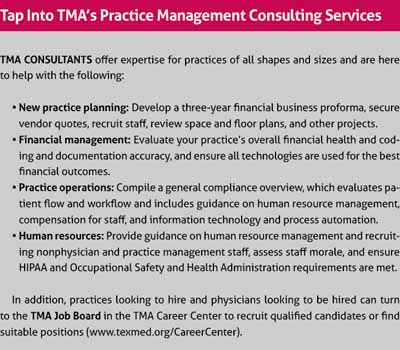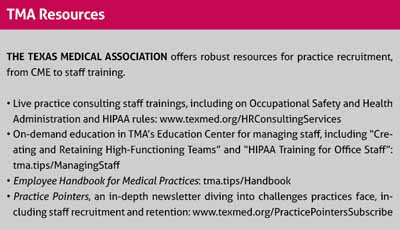
Waco family physician Aaron Kolar, DO, was initially hesitant to open his own practice. Coming out of residency, he had questions about staffing, finances, and finding the right electronic health record (EHR) vendor, among other concerns.
“The full scale of opening a practice was daunting,” he said. “There was so much apprehension.”
Knowing they needed expert guidance to open their practice, Dr. Kolar and his partner, Waco family physician Stefan Huber, DO, took their questions to the Texas Medical Association’s Practice Management Services – a team of consultants, certified coders and auditors, and other experienced professionals.
“Even knowing on a psychological level that we have a support system, especially one comprised of experienced consultants like TMA’s consultants, was huge,” Dr. Kolar said.
Cost wasn’t the only challenge Drs. Kolar and Huber were worried about. Staffing shortages aggravated by the COVID-19 pandemic were a major concern for the family physicians.
“Whenever you go through a traumatic experience like the health care workers experienced during the pandemic, you start to ask yourself questions,” Dr. Huber said. “‘Why am I doing this? Why am I working this job?’ And those concerns aren’t isolated to physicians. … Everyone in this field has asked themselves those very questions.”
According to a 2021 Washington Post-Kaiser Family Foundation survey, nearly 30% of health care workers considered leaving the profession, citing burnout as a significant concern. For many practices, these shortages can cause significant disruptions to essential services, or worse, force them to close permanently because of lack of resources, leaving patients with less access to vital health care.
“A lot of health care workers began dropping out when the pandemic happened,” Dr. Huber said. “And burnout is still prevalent despite the end of the public health emergency. The downfalls of COVID are still here.”
Getting started
And TMA is here to help.
TMA members and their practice staff can access affordable and highly rated practice management services and consultants who are here to provide hands-on, in-depth help with new practice planning, recruitment, and financial management to practices of all shapes and sizes. (See “Tap Into TMA’s Practice Management Consulting Services,” right.)

Practice management consultant Teri Deabler began guiding Drs. Kolar and Huber with a financial proforma, which included benchmark data on internal and family medicine doctors to help project their clinic’s viability. She also helped the pair connect with real estate agents in the area to hasten their office build.
That’s when “the ball really started rolling,” Dr. Kolar said.
“We go through the entire practice planning process with physicians and aid in whatever way we can,” Ms. Deabler said. “Sometimes that means financial (planning) help, other times it means scouting locations for a new clinic. Essentially, we provide the insight of a recruiting firm for a much lower price.”
Cost was one factor in Drs. Kolar and Huber’s apprehension. The pair were wary of making quick decisions that could cost thousands of dollars, leading them to seek guidance from TMA consultants.
And they were right to consult the experts.
Solo physicians opening new practices can spend up to $400,000, says Heather Bettridge, associate vice president of TMA Practice Management Services. At the same time, some specialties and urgent care centers often expect to pay more than $1 million.
“This is a big investment that physicians shouldn’t undertake casually,” Ms. Bettridge said. “Start-up expenses alone can be over $150,000 depending on equipment and other needs. Robust EHRs can be between $40,000 and $80,000.”
Ms. Bettridge also noted that physicians get “little to no education on the business side of medicine” and often find themselves needing guidance from experienced professional advisors like practice management consultants, attorneys, and real estate agents with extensive health care knowledge and experience.
“It often takes an expert to navigate practice challenges, from cost to staffing,” she said.
Staffing struggles
Ms. Bettridge says office staff have been especially hard to recruit after the pandemic.
In fact, a 2022 poll by the Medical Group Management Association (MGMA) found that medical assistants, front-desk workers and receptionists, and nurses had the highest rates of turnover among staff.
Top reasons for turnover, says MGMA, include leaving for better pay and benefits elsewhere, which Ms. Bettridge says leads many practices to increase their wages to attract potential hires.
“Employees are demanding higher pay after the pandemic,” she said. “In response, wages have increased, and when you multiply that by multiple employees, the cost is significant.”
This doesn’t have to be a negative, however. Staffing challenges provide an opportunity for practices to grow, Ms. Bettridge says, and for physicians to become more business savvy.
“We get a lot of calls from people who feel desperate, and we tell them the same thing every time: ‘You’re going to be okay. We’re going to help you through this,” she said.
Front desk employees don’t need to be certified or licensed, Ms. Bettridge commonly advises practices. And combing through a robust pool of applicants can provide great employees for practices struggling to find staff.
“An applicant with great customer service skills can be trained in health care, no matter their background,” she said. “Practices need to think outside the box to find employees.”
Doing just that, Drs. Kolar and Huber worked with Ms. Deabler to create solutions for burnout their staff may experience once their practice opens in July.
Under her guidance, the duo decided to implement staff check-ins, provide a competitive hourly wage, use an iPad-enabled smart dictation device to reduce the time staff spend updating patients’ EHRs, and offer telemedicine services so both patients and staff can spend less time in the office.
Without these incentives, Dr. Huber believes the clinic would “struggle to find staff.”
“Staff members want to feel like a valued part of a team, especially after the pandemic, and won’t apply unless we can offer a good life balance and other benefits,” he said. “To attract employees, we need to step our game up as employers.”
The pair also plan to look for employees with a wide range of skills, both in the health care industry and outside of it, citing Ms. Deabler’s warning:
“If an applicant meets 70% of your wish list, you’d better snag them,” she said.

Not just a warm body
TMA consultants face staffing challenges head on by recruiting and reviewing new employees for practices, including managerial, clinical, and business staff.
TMA consultants do all the heavy lifting by screening possible hires and their resumes, facilitating and attending interviews, completing background and Office of Inspector General checks, contacting references, and drafting offer letters. If a practice extends an offer, TMA consultants will then negotiate on their behalf.
“We’re not just putting a warm body in a seat,” Ms. Bettridge said. “We do our due diligence to make sure everyone we present for hire is a good fit for the practice.”
For TMA past President David Fleeger, MD, these consultant services put him at ease.
“My practice used guidance from TMA’s practice consulting to fill upper-level administrative positions like office administrator and office manager,” he said. “It can be difficult for physicians to find the time to go through scores of cover letters and interviews to try to figure out who would fit and who wouldn’t. That burden was removed from us by TMA’s practice consultants.”
But as no two practices are the same, TMA consultants have worked on numerous custom projects for their clients, including:
- “Mystery shopping” practices to evaluate operations and create strategies for a more efficient and desirable workplace;
- Developing a compensation plan analysis and options to attract employees in a competitive market; and
- Developing new, topic-specific presentations and training to coach staff to become health care experts.
“With TMA, we never considered that we wouldn’t find employees,” Dr. Kolar said. “It was always our consultant saying, ‘We are going to help you get employees’.” n